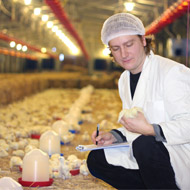Poultry sector cuts antibiotic use by 71 per cent

The poultry meat industry has reduced its use of antibiotics by 71 per cent.
The UK poultry industry reduced its use of antibiotics by 71 per cent since 2012, according to a new report.
The study by the British Poultry Council also shows that, in the last four years, poultry meat production increased by 11 per cent.
It also highlights several ‘big achievements’ resulting from BPC Antibiotic Stewardship - a scheme established in 2011 to protect the health and welfare of birds and safeguard the efficacy of antibiotics.
BPC chairman, John Reed, commented: “We are delighted with the progress we’ve made, but there is more work to be done. Our Antibiotic Stewardship continuously reviews on-farm management practices to ensure sustainable use of antibiotics throughout our supply chain.”
The BPC Antibiotic Stewardshipship Report 2017 highlights that the BPC stewardship scheme:
• Stopped the prophylactic use of antibiotics
• Restricts the use of antibiotics classified as highest priority critically important by the WHO
• Banned the use of third and fourth generation Cephalosporins in 2012
• Stopped using Colistin in 2016
• Only uses Fluoroquinolones and Macrolides as a last resort
• Achieved a 71 per cent reduction in total antibiotic use from 2012-2016
It states that the success of its programme is the result of its ‘committed and professional workforce’, which ensures that antibiotics are used ‘only when necessary’.
Mr Reed concluded: “Our farmers and veterinarians need antibiotics in their toolbox to treat sick birds – zero use is not an option – and we will protect the health and welfare of our birds. We will safeguard the efficacy of antibiotics as part of sustainable food production, and we will continue to feed the nation.”



 The latest
The latest